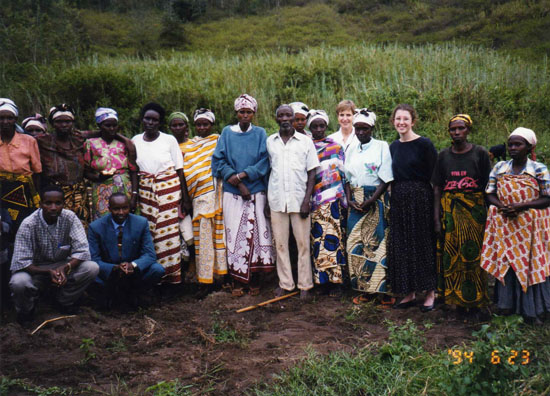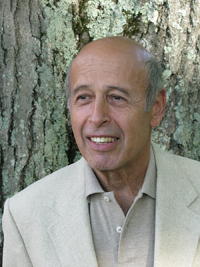Beyond Evil

 By Ervin Staub
By Ervin Staub
Survivors of genocide are deeply affected. Research has shown that people who are victimized, even to a much lesser degree than those who are targeted in genocide, tend to perceive the world as hostile and dangerous. Individuals and groups that have been greatly harmed typically perceive the behavior of other people or whole groups as a threat to them. They may attempt to defend themselves by force, even when this is not necessary, becoming harmdoers. Or deeply affected by the cruelty and injustice of the world, and feeing diminished, they may withdraw, distancing themselves from other people. But people can also become caring and helpful as a result of their own suffering, especially when they have certain ameliorating experiences.
An example of how having been targeted for killing can affect perception comes from Rwanda, where there was a genocide against Tutsi in 1994. In 1999 I interviewed survivors who were rescued. One of them described how men came to her house and took away her husband and brother. She had known these men before the genocide, and one of them sent another man to her house in order to protect her. This Hutu man arrived with a Bible under his arm, stayed in a room away from her, but when men repeatedly came to the house to take her away, he confronted them and managed to get them to leave.
When the genocide in Rwanda was stopped by the Rwandan Patriotic Front, the rescuer, apparently afraid because he was a Hutu, left Rwanda for Zaire (now the Congo) together with about one and a half million Hutu. Not long before I interviewed this survivor, he returned and came to see the woman. She said to me: “Why did he come? What did he want? Now that the situation has changed, I can have the government protect me.”
This rescuer never behaved inappropriately toward her, saved her life, in fact, but presumably because she was so deeply wounded and because he was a Hutu, she felt she needed protection from him. *
This survivor was part of the first of many training sessions my associate Laurie Anne Pearlman and I conducted in Rwanda between 1999 and 2007 with Rwandan survivors. These sessions covered the origins and effects of genocide, and avenues to prevention and reconciliation. We have also developed ongoing educational radio programs, in collaboration with a Dutch NGO, LaBenevolencija. The interview I described, in which the survivor spoke of her experience during the genocide, appeared to be healing for her. In the training she was quiet and withdrawn, looking downcast in photos. A year later, we reassembled the group to find out what use they had made of the training. Now she was much more active, out front in describing the benefits of the training and the way she used it. A year had passed with intervening experiences, but this change in her is consistent with the potential benefits of testimony. As part of our training, we also had participants gather in small groups in which they could talk about their experiences during the genocide. Evaluations of our training revealed many benefits, including a decrease in trauma symptoms, not only in the people we trained but also in people some of them later trained. But the change in this woman stood out.
One avenue to healing is people describing painful experiences. Even writing about such experiences for a short time has significant beneficial effects. Talking about intensely painful events to empathic listeners is especially healing. Since a usual aspect of victimization and trauma is that the person who has been harmed had no control over what was done to him or her, it is important that the person talking about such experiences has control over pace and content. This can be the case in testimony.
While earlier research has focused on the deleterious effects of having been victimized, many people who have been greatly harmed either help others who have been harmed or work to prevent harm. I have called this altruism born of suffering. Some people, having suffered, don’t want others to suffer.
There are many examples. Many Holocaust survivors have worked to prevent genocide at other places, or create more just societies, or work in social service professions. A woman who came from a terrible background of deprivation, abandonment, and rape started an orphanage in Vietnam for the abandoned and often despised children of American soldiers. With one of my students, Johanna Vollhardt, now a professor, we found in research that studied other matters, including on the effect of the Holocaust on survivors, evidence about altruism born of suffering. In a study we conducted, somewhat to my surprise, we found that students who reported that they have suffered because of their group membership or harm done to them in their families were on the average more caring and helpful than those who said they had not suffered. So altruism born of suffering does not seem a rare phenomenon.

(Rwandan Genocide survivors who participated in a training session conducted by Ervin Staub and Laurie Anne Pearlman)
What might contribute to this? Healing from psychological wounds is important. Since engagement with one’s experience under supportive conditions is essential to healing, testimony can both be healing and a starting point for a journey toward further healing experiences. Testimony can be given to a listener or interviewer, or in front of a supportive group, as in the case of groups of Holocaust survivors meeting all over the United States, or survivors meeting in a group and giving testimony at Solace ministries in Rwanda.
In a country like Rwanda, where everyone is wounded to some degree, people empathically listening to one another, something we advocate through the examples of the behavior of characters in our radio drama in Rwanda, Musekeweya (“New Dawn”), is an important avenue to community healing. Evaluations have shown that this ongoing and highly popular radio drama, which started to be broadcast in 2004, has had a variety of benefits, such as increased empathy and people saying more what they believe. Commemorations can also be valuable for healing, especially when, in addition to remembering the painful past, they point to a hopeful future.
Testimony can also make “knowing but not knowing” less likely. Children and others in a family sometimes know that terrible things have happened to their parents or family members, but with survivors remaining silent, they don’t know much more. This adversely affects them. Having given testimony, people are more likely to talk about what has happened, and do it in a balanced manner appropriate for children, grandchildren, and other family members.
Having received help at the time of suffering seems to contribute to later altruism. Having been rescued, or even given limited help like food, can say to a person that there is kindness in the world and that the world does not have to be as the perpetrators made it to be. Having been able to act in one’s own or in others’ behalf—which intended victims of genocide often do not have a possibility to do—can also contribute, by empowering a person. In one study Holocaust survivors in Israel who reported that they were both helped, and were able to act in their own or their family’s behalf, were more likely to engage in activities aimed at making peace with Palestinians.
Receiving support, care, and affection after one has suffered matters a great deal. Some specialists in psychological trauma say that trauma is, in part the experience of harmful events, in part what happens afterward. Finally, love and care before traumatic events can make a person more resilient. Perhaps the resilience of many Jewish survivors of the Holocaust is the result of loving families. Both can contribute to altruism born of suffering.
Such altruism is of great importance. Since we have a world that inflicts suffering on many people, without experiences that transform suffering into caring, people can be increasingly alienated from or hostile toward others. It is important both to help people who have suffered, and for people to join together to work to create societies that do not harm their members.
There is commonality in the influences that lead to genocide. There is also commonality in how people are affected by extreme violence. By showing this, testimony can demonstrate our common humanity. Through that it can, in turn, advance empathy and caring for all human beings.
*I described the essential elements of this story as I was told but changed some details for the sake of confidentiality.
USC Shoah Foundation, Radio La Benevolencija, Aegis Trust Rwanda and The Institute of Research and Dialogue for Peace launched the Rwanda Peace Education Program in December 2013. The program, supported by the Swedish International Development and Cooperation Agency in Rwanda for three years, intends to take Peace Education to new heights in Rwanda through activities including artistic exhibitions, archive building and education workshops.